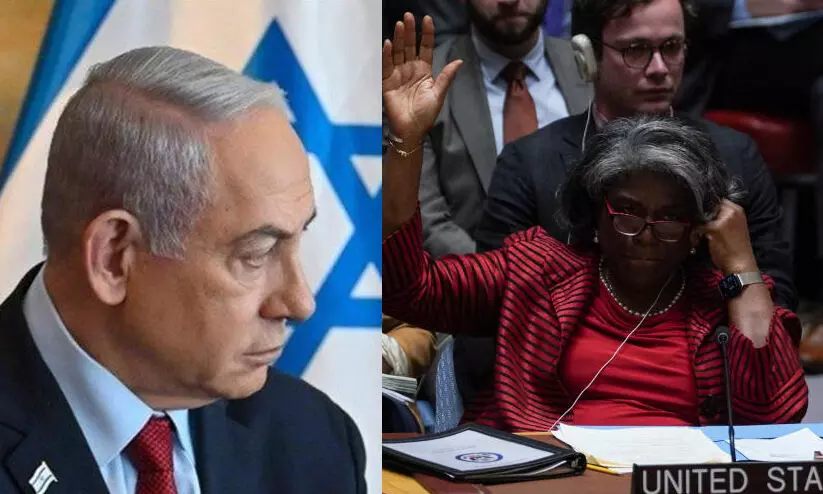
US to veto Algeria’s UN resolution for ceasefire while Netanyahu obstinate to flatten Rafah
text_fieldsDespite its claim of efforts to put an end to the ongoing Israeli war on Gaza, which has seen over 29,000 innocent people killed, the US seems to be more aligned with the Israeli plan to genocide Gazans, while approving weapons supply and possibly using its veto power to halt a proposed Algerian resolution at the UN calling for an immediate ceasefire in Gaza.
This comes amid Netanyahu’s adamant stand that he will go ahead with the ground offensive in Rafah, which accommodates millions of displaced Gazans, repugnantly rejecting a global warning of humanitarian catastrophe in Rafah. This shows Israel is not ready to concede to any global rules while the world is watching helplessly, unable to restrain Israel.
Algeria, currently occupying the Arab seat at the UNSC, has been pushing for a resolution demanding an urgent humanitarian ceasefire, citing the need to halt the forced displacement of Palestinians and ensure unhindered humanitarian aid flow into Gaza.
However, the US, through its representative Linda Thomas-Greenfield, has firmly stated its opposition to the draft resolution, signalling that it will not garner sufficient support for adoption.
The US has emphasized its commitment to pursuing a diplomatic solution to the Gaza conflict, with negotiations underway for a potential hostage deal between Israel and Hamas. This proposed ceasefire, if achieved, aims to establish six weeks of calm, providing a crucial opportunity to lay the groundwork for a more sustainable peace agreement.
President Joe Biden has personally engaged in discussions with key regional leaders from Israel, Egypt, and Qatar in recent days, although significant gaps in negotiations persist. The US stresses the importance of all parties supporting the ongoing diplomatic process rather than pursuing measures that could derail potential progress.
Despite international pressure for a ceasefire, Israeli Prime Minister Benjamin Netanyahu has reiterated his rejection of calls to hold off on a ground offensive in Rafah, while his cabinet has voted to formally oppose international efforts toward what they term as "unilateral recognition" of a Palestinian state.
Diplomatic initiatives led by Egypt, Qatar, and the US have faced setbacks, with talks between Israel and Hamas in Cairo reportedly hitting an impasse. Additionally, the anticipated new push for a UN Security Council resolution on a ceasefire is expected to be met with a US veto, further complicating efforts to de-escalate the conflict.
The prolonged conflict in Gaza has taken a devastating toll on its inhabitants, with thousands killed, displaced, and facing critical humanitarian challenges. The ongoing Israeli offensive, including airstrikes and ground operations, has targeted civilian infrastructure, including healthcare facilities, drawing condemnation from international observers.
Recent Israeli military actions, including the raid on the Nasser hospital compound, have exacerbated the humanitarian crisis in Gaza, with patients left without essential medical care and facilities struggling to function amid power shortages. The situation has prompted accusations of war crimes, although Israeli authorities maintain that they are targeting Hamas militants using civilian sites for cover.
Prime Minister Netanyahu has defended Israel's military actions, arguing that a ground offensive in Rafah is necessary to confront Hamas effectively. Despite growing international criticism, including from the US, Netanyahu remains steadfast in his approach, emphasizing the need to prioritize Israel's security concerns.
Tensions between the US and Israel have intensified in the wake of the Gaza conflict, with President Biden expressing concerns over the escalating death toll and advocating for a post-war proposal that could include the establishment of an independent Palestinian state. However, Netanyahu has rebuffed such suggestions, indicating a potential strain in the traditionally strong US-Israeli relationship.























